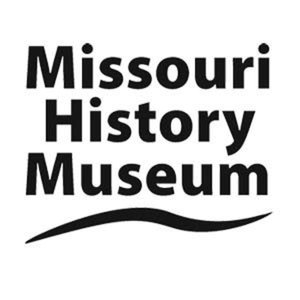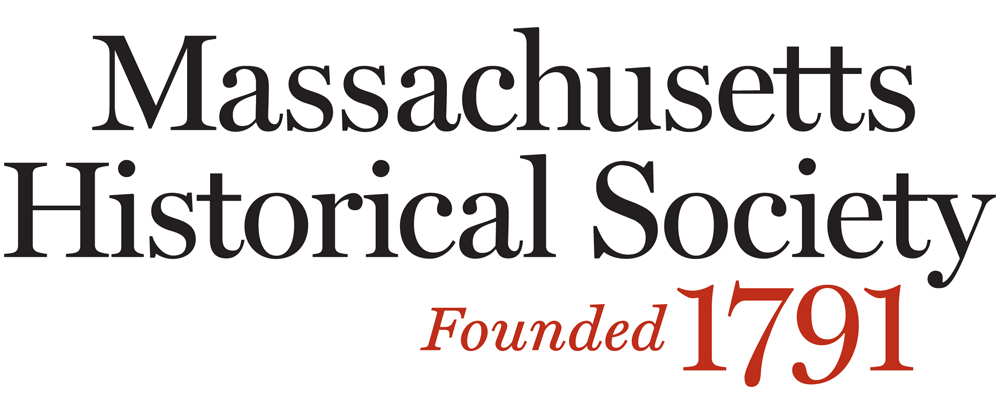Items in Remembering Lincoln that are transcribed.
from Apr. 19, 1865
Sallie Thomas to George W. Parker
-
Full Title
Letter of Sallie Thomas, Elizabethtown, Ky., to Brother [George W. Parker], April 19, 1865
-
Description
Discusses the health of the family and mentions the assassination of President Lincoln. Sallie fears that the next president will be even worse than Lincoln was.
-
Transcription
Elizabethtown, Ky,
April 19, 1865
My good Brother,
I received your very kind
letter a few days ago, which was perused
with great interest.
I was sorry to learn that Sis Nellie
and the baby were not well, but
suppose they are well by this time.
And was very sorry to hear of Uncle
James’ illness, hope he has entirely
recovered.
We are all as well usual, but some
of us are complaining all of the
time, I am not very well myself
to day, I suppose you will think
I ought not to complain when
I tell you I weigh a hundred and
forty pounds.
Ma is up again, but her health is
not good at all. I do wish I could
get her out there, once I think it
would help her. The negroes fret her
all of the time, and now they
are twice as bad as they ever were.
Lincoln is dead, and am fearful
we will have a worse President
than he was, and will make
things worse all around.
We are very busy now making the
negroes' spring clothes, and Pa
is behind hand with his work,
it has rained so much this, spring
and he is scared of help, which will
make him, backward with his crop.
Pa tells me every letter I write, to tell
you to, come, and every letter I get
from you, he asks if you are
coming, at last, he said well let
him stay. Ma will drop you a
few lines. Give my love to all
and write soon to your sister
Sallie Thomas.
[Transcription Team: Lance R., Madison H., Kelsey K., Drake W., Jerzi G., Sanja D.]
[New Hampton Middle School]
-
Source
Missouri History Museum
-
Rights
This item is in the public domain.
-
Tags
-
Cite this Item
Thomas, Sallie. "Letter of Sallie Thomas, Elizabethtown, Ky., to Brother [George W. Parker], April 19, 1865". Remembering Lincoln. Web. Accessed December 14, 2025. https://rememberinglincoln.fords.org/node/317
from Apr. 19, 1865
Letter of Sallie Thomas, Elizabethtown, Ky., to Brother [George W. Parker], April 19, 1865
![Letter of Sallie Thomas, Elizabethtown, Ky., to Brother [George W. Parker], April 19, 1865](https://rememberinglincoln.fords.org/sites/default/files/141-Sallie%20Thomas%20Letter%2C%20page%201.jpg)
-
Description
Discusses the health of the family and mentions the assassination of President Lincoln. Sallie fears that the next president will be even worse than Lincoln was.
-
Source
Missouri History Museum
-
Rights
This item is in the public domain.
-
Creator
Thomas, Sallie
-
Date
April 19, 1865
from Apr. 17, 1865
Moses Many Lightning Face to S.R. Riggs
-
Full Title
Letter from Moses Many Lightning Face to S. R. Riggs from Davenport, Iowa
-
Description
After the hanging of 38 Dakota warriors in Mankato, Minnesota in the aftermath of the U.S.-Dakota War, the other 270 Dakota men who had been sentenced but not hung were sent to a prison camp in Davenport, Iowa. This is where they heard the rumor of President Lincoln's assassination. Moses Many Lightning Face, one of the prisoners, sent this letter to missionary Stephen Riggs asking if the rumor was true. It was recently translated from the Dakota by Dr. Clifford Canku/Mato Watakpe and published in the book The Dakota Prisoner of War Letters; the original is in the Collection of the Minnesota Historical Society.
-
Transcription
Davenport, Iowa April 17, 1865
S.R. Riggs
Well, my relative, I wish to write you a letter, we have heard news. They have said that the President [Abraham Lincoln] was killed. But someone of authority should tell us if this is not true. Thus, my relative, I write to you this letter. Also, I have heard several rumors, therefore, I want to write you this letter – it is so. The President has compassion for us, as so far we are still alive, but now they told us he was killed, and we are saddened. Those of us here think if this is so, we are heartbroken. Perhaps the attitude of the cavalry soldiers may change toward us. Tell me what your thoughts are, I want to know, that’s why I write to you. Then I wish to hear exactly how they killed the President. Then, also on Sundays when I am able, I do the preaching to them. That is all I’m going to say, I shake all your hands.
Moses Many Lightning Face This is me
-
Source
Minnesota Historical Society
-
Rights
Use of this item for research, teaching, and private study is permitted with proper citation and attribution, as Joseph A. Wheelock and family papers, Minnesota Historical Society. Reproduction of this item for publication, broadcast, or commercial use requires written permission. For permission, please see this web page.
-
Tags
-
Cite this Item
Moses Many Lightning Face and Clifford Canku/Mato Watakpe. "Letter from Moses Many Lightning Face to S. R. Riggs from Davenport, Iowa". Remembering Lincoln. Web. Accessed December 14, 2025. https://rememberinglincoln.fords.org/node/300
from Apr. 17, 1865
Letter from Moses Many Lightning Face to S. R. Riggs from Davenport, Iowa
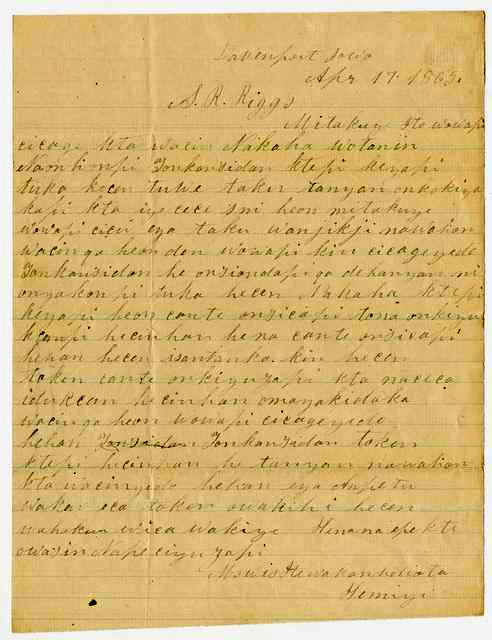
-
Description
After the hanging of 38 Dakota warriors in Mankato, Minnesota in the aftermath of the U.S.-Dakota War, the other 270 Dakota men who had been sentenced but not hung were sent to a prison camp in Davenport, Iowa. This is where they heard the rumor of President Lincoln's assassination. Moses Many Lightning Face, one of the prisoners, sent this letter to missionary Stephen Riggs asking if the rumor was true. It was recently translated from the Dakota by Dr. Clifford Canku/Mato Watakpe and published in the book The Dakota Prisoner of War Letters; the original is in the Collection of the Minnesota Historical Society.
-
Source
Minnesota Historical Society
-
Rights
Use of this item for research, teaching, and private study is permitted with proper citation and attribution, as Joseph A. Wheelock and family papers, Minnesota Historical Society. Reproduction of this item for publication, broadcast, or commercial use requires written permission. For permission, please see this web page.
-
Creator
Moses Many Lightning Face and Clifford Canku/Mato Watakpe
-
Date
April 17, 1865
from Apr. 14, 1865
Senator Alexander Ramsey Diary
-
Full Title
Senator Alexander Ramsey's Diary Entries, April 1865
-
Description
Senator Ramsey of Minnesota was in Washington D.C. when President Lincoln was assassinated. These are his diary entries from when it happened, including details as he heard them; being part of President Johnson inauguration; and his participation in the congressional escort on Lincoln's funeral train.
-
Transcription
April 14, 1865
At 10 ½ pm at Fords Theater the Presd. of U.S. was shot by J. Wilkes Booth of which he died. Booth escaped.
Mr. Secretary Seward and his son Frederick and the male servant of the Secretary were attacked (?) at the same time by an accomplice of B. with a knife – and is lingering with little hope of their recovery.
The President died at 7 ½ a.m.
Was present with Hon. Senators Foote of Vt. Gates of Ill. And Steward of Nevada at the inauguration of V. Pres. Johnson as Presd. about 10 in all witnessed the administration of the oath at 11 am by Chf. Justice Chase.
Cigar .30
Newspapers 5 & 16 .21
Boot(?) knife
Paid for use of above senators and myself for carriage 5.00
April 21, 1865
Left Washington as one of a congressional escort in conveying the body of Abm. Lincoln late Presid. of U.S. from Washington to Springfield. Left at 8 a.m. reached Baltimore at 10 and left at 5 PM and reached Harrisburg at 8 pm
(?) Trunk .50
at Baltimore .30
-
Source
Alexander Ramsey and Family Papers, Minnesota Historical Society
-
Rights
Use of this item for research, teaching, and private study is permitted with proper citation and attribution, as Alexander Ramsey and Family Papers, Minnesota Historical Society, Minnesota Historical Society. Reproduction of this item for publication, broadcast, or commercial use requires written permission. For permission, please see this web page.
-
Tags
-
Cite this Item
Alexander Ramsey. "Senator Alexander Ramsey's Diary Entries, April 1865". Remembering Lincoln. Web. Accessed December 14, 2025. https://rememberinglincoln.fords.org/node/292
from Apr. 14, 1865
Senator Alexander Ramsey's Diary Entries, April 1865
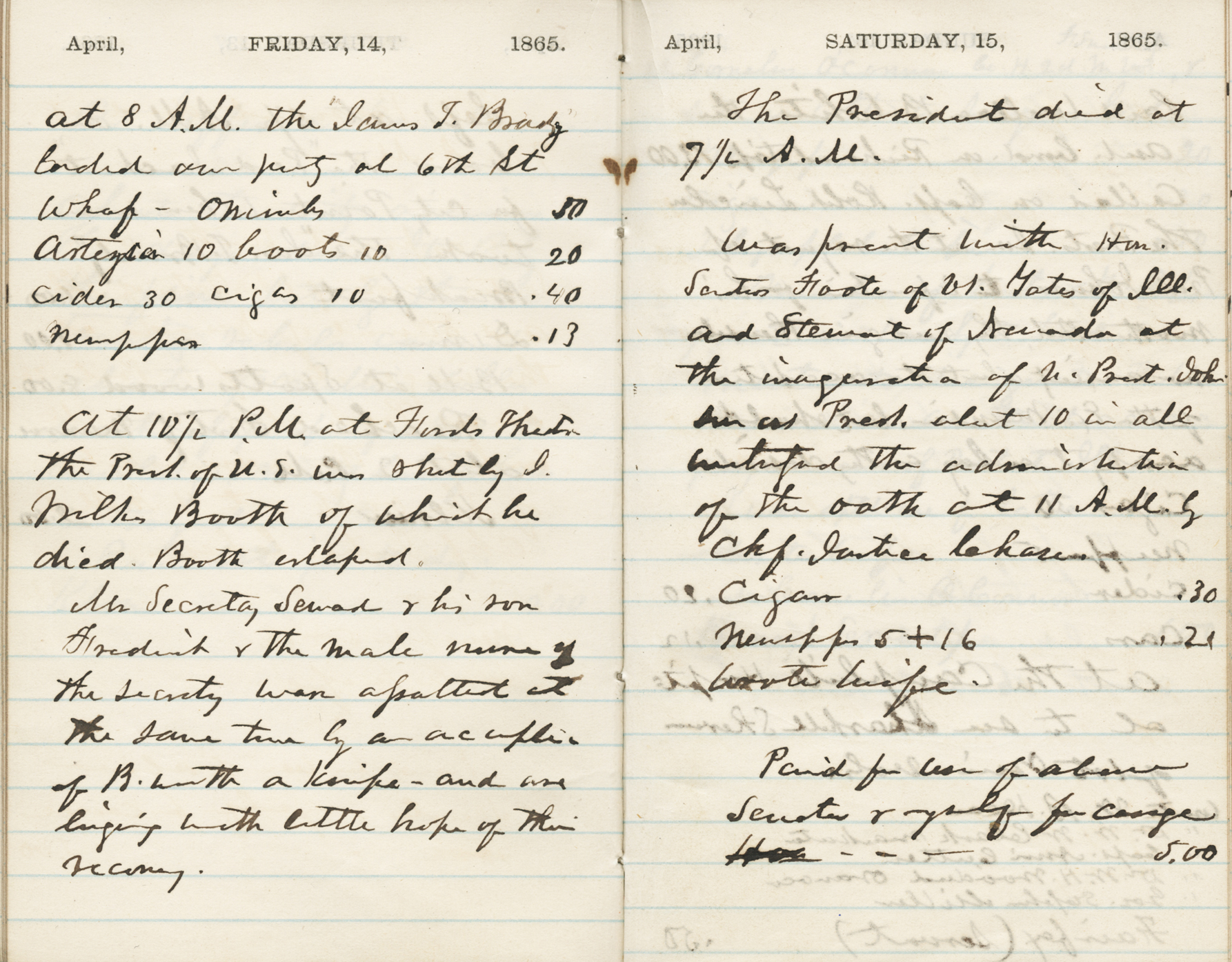
-
Description
Senator Ramsey of Minnesota was in Washington D.C. when President Lincoln was assassinated. These are his diary entries from when it happened, including details as he heard them; being part of President Johnson inauguration; and his participation in the congressional escort on Lincoln's funeral train.
-
Source
Alexander Ramsey and Family Papers, Minnesota Historical Society
-
Rights
Use of this item for research, teaching, and private study is permitted with proper citation and attribution, as Alexander Ramsey and Family Papers, Minnesota Historical Society, Minnesota Historical Society. Reproduction of this item for publication, broadcast, or commercial use requires written permission. For permission, please see this web page.
-
Creator
Alexander Ramsey
-
Date
April 14, 1865
from May. 5, 1865
Augustus Clark to John A. Andrew
-
Full Title
Letter from Augustus Clark to John A. Andrew, 5 May 1865
-
Description
Augustus Clark, a War Department employee,sent this letter to the Governor of Massachusetts, John A. Andrew along with a small piece of cloth that was stained with the blood of Abraham Lincoln. Clark was one of the people who moved Lincoln from Ford's Theatre to Petersen's boardinghouse.
-
Transcription
Ordnance Office, War Department. Washington, May 5th 1865
Governor John A. Andrew
Sir
Enclosed please find a piece of
cloth that is stained with the blood of our lamented
President, Abraham Lincoln.
I was one of several who helped to
convey him over from the theatre to the house where he
died and remained there all night. I also have a
lock of his hair: and have already had several offers from
different parties, who are desirous of obtaining it for a relic.
Being a Bostonian I thought I would mention the fact
to you thinking perhaps the state might wish to secure it.
I am very Respectfully
Your Obt Servt,
Augustus Clark
-
Source
Massachusetts Historical Society, Special collections, manuscripts
-
Rights
Use of this item for research, teaching, and private study is permitted with proper citation and attribution, as: From the Collection of the Massachusetts Historical Society. Reproduction of this item for publication, broadcast, or commercial use requires written permission. For permission, please see this web page
-
Tags
-
Cite this Item
Clark, Augustus. "Letter from Augustus Clark to John A. Andrew, 5 May 1865". Remembering Lincoln. Web. Accessed December 14, 2025. https://rememberinglincoln.fords.org/node/288
from May. 5, 1865
Letter from Augustus Clark to John A. Andrew, 5 May 1865
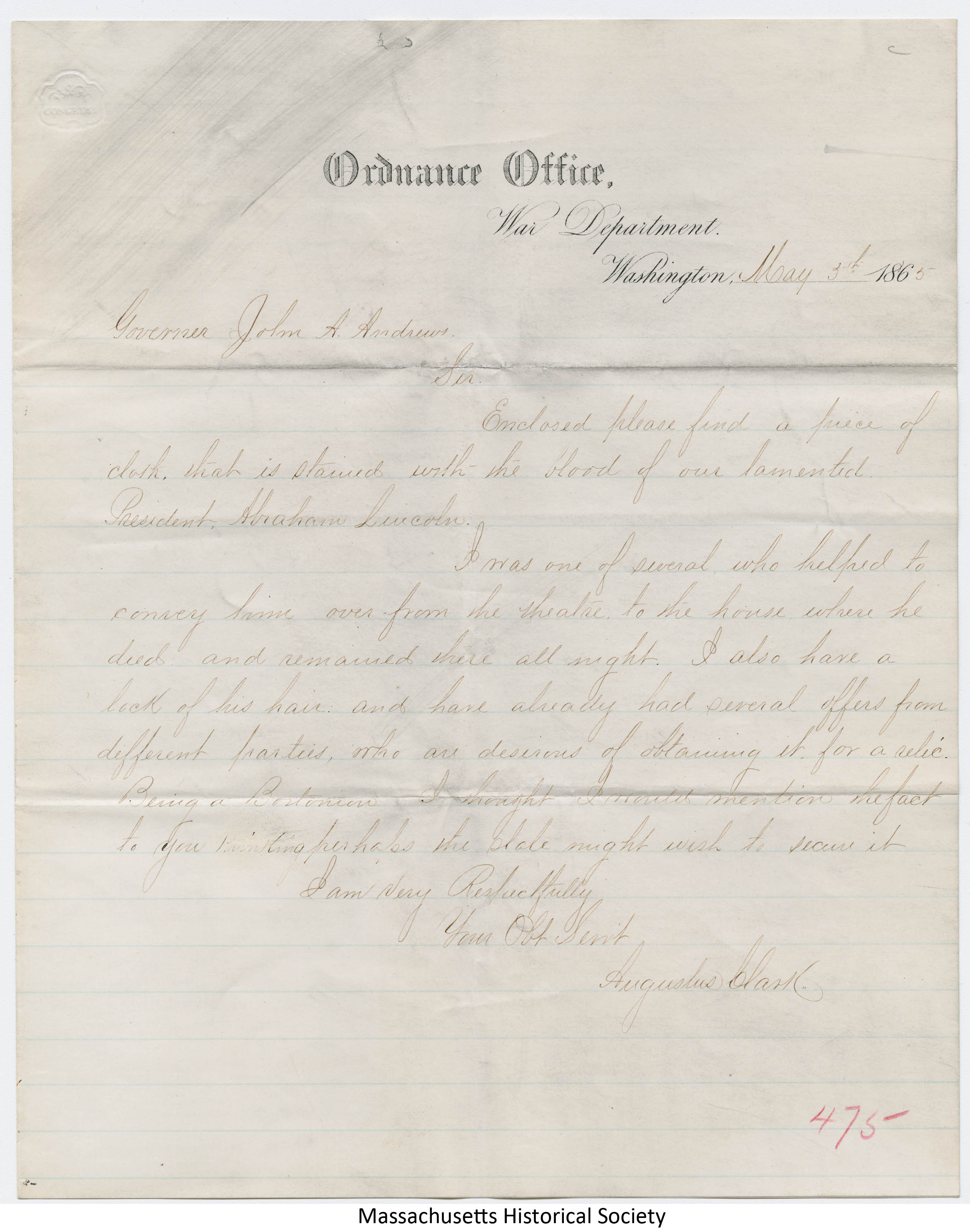
-
Description
Augustus Clark, a War Department employee,sent this letter to the Governor of Massachusetts, John A. Andrew along with a small piece of cloth that was stained with the blood of Abraham Lincoln. Clark was one of the people who moved Lincoln from Ford's Theatre to Petersen's boardinghouse.
-
Source
Massachusetts Historical Society, Special collections, manuscripts
-
Rights
Use of this item for research, teaching, and private study is permitted with proper citation and attribution, as: From the Collection of the Massachusetts Historical Society. Reproduction of this item for publication, broadcast, or commercial use requires written permission. For permission, please see this web page
-
Creator
Clark, Augustus
-
Date
May 5, 1865
-
Material
24.8 cm x 20 cm
from Apr. 16, 1865
Augustus Clark to S. M. Allen
-
Full Title
Letter from Augustus Clark to S. M. Allen, 16 April 1865
-
Description
This letter, written by Augustus Clark, a War Department employee, to his uncle, Stephen M. Allen of Woburn, Massachusetts, includes a firsthand account of the awful scenes at Ford's Theatre in Washington, D.C. after John Wilkes Booth had shot Abraham Lincoln. Clark also describes what he witnessed at Petersen's boardinghouse across the street from the theatre, where Lincoln died.
-
Transcription
[Page 1]
Ordnance Office, War Department Washington, April 16 1865
Dear Uncle [S. M. Allen ]
You have of course heard all the particulars of the
dreadful death of the President on the 14th inst But as
I was an eye Witness of the latter part I will endeavor to explain
matters. At 10¼ Oclock I was looking out of a window of
a house opposite the theatre and seeing a large excited crowd
rush from it I thinking some one might have been robbed
ran down stairs and across the street into the theatre and then
heard the awful words, "Lincoln is shot"—I sprang off towards
the stage over the seats every one being in the wildest commotion
and on reaching it saw a lady reaching over the right
hand box second tier it was the daughter of Senator Harris of
N.Y. I clambered up seized her hand and drew myself into
the box and there on the floor lay Abraham Lincoln dying:—
his wife near him shrieking and moaning, Major Rathburn
and a few others near by. Several of us lifted him and
carried him out to the street and finding his carriage gone
I said "take him across the street" he was carried into the
house I had just left, and deposited on a bed, his clothes
[Page 2]
stripped off:— he was shot in the head on a line with the
left ear about 2 inches towards the back of the head,
the Ball was round and entered about three inches in a
line towards his right eye—he was breathing very heavily
and his pulse fluctuated from 105 to 42 in about three hours.
The blood soon begun to settle under his left eye and blackened
the whole side of his face. Mrs Lincoln soon came over and
was hardly sane all night and is now quite low, Laura
Keene came over with her but did not stop—his [son] came in
about Eleven and was much agitated. Soon all the members
of the Cabinet rushed in with grief and terror depicted on
their faces: many Senators and members arrived during the
night—the street was cleared of all strangers and a great
military force stationed around the square. Stanton was there
issuing orders to all parts of the union and seemed to
do most of the business. news came about eleven that Seward
was fearfully stabbed and it seemed to strike terror into the
hearts of all. Maj. Rathburn was wounded badly in the arm and
fainted twice before his wound was dressed and he got home.
Mrs Lincoln came into the room seven times during the
night and felt dreadfully she fainted twice and fell over onto
the floor. I remained in the room all night long and did
all I could to help. The best surgeons were there but no
[Page 3]
attempt was made to extricate the Ball as he was pronounced
fatally wounded at first examination he lingered
on 'till seven twenty "AM" when he breathed his last in
presence of the members of the Cabinet several senators
and others. Mrs Lincoln was not in the room at the time of
his death. The body at nine oclock was taken to the White
House and has been embalmed. I got a lock of his
hair and a towel saturated with the blood of the best
man that ever was President and a friend of the south.
They now have a President that will show them no mercy
and they deserve none. I will enclose a piece of the towel
for you as a relic.
The folks are all well and hope this
will find you family the same. Give my love to all
and excuse this writing as it is quite late and I am
very nervous.
I am as Ever Yours Truly
Gussie
-
Source
Massachusetts Historical Society, Special collections, manuscripts
-
Rights
Use of this item for research, teaching, and private study is permitted with proper citation and attribution, as: From the Collection of the Massachusetts Historical Society. Reproduction of this item for publication, broadcast, or commercial use requires written permission. For permission, please see this web page.
-
Tags
-
Cite this Item
Clark, Augustus. "Letter from Augustus Clark to S. M. Allen, 16 April 1865". Remembering Lincoln. Web. Accessed December 14, 2025. https://rememberinglincoln.fords.org/node/287
from Apr. 16, 1865
Letter from Augustus Clark to S. M. Allen, 16 April 1865
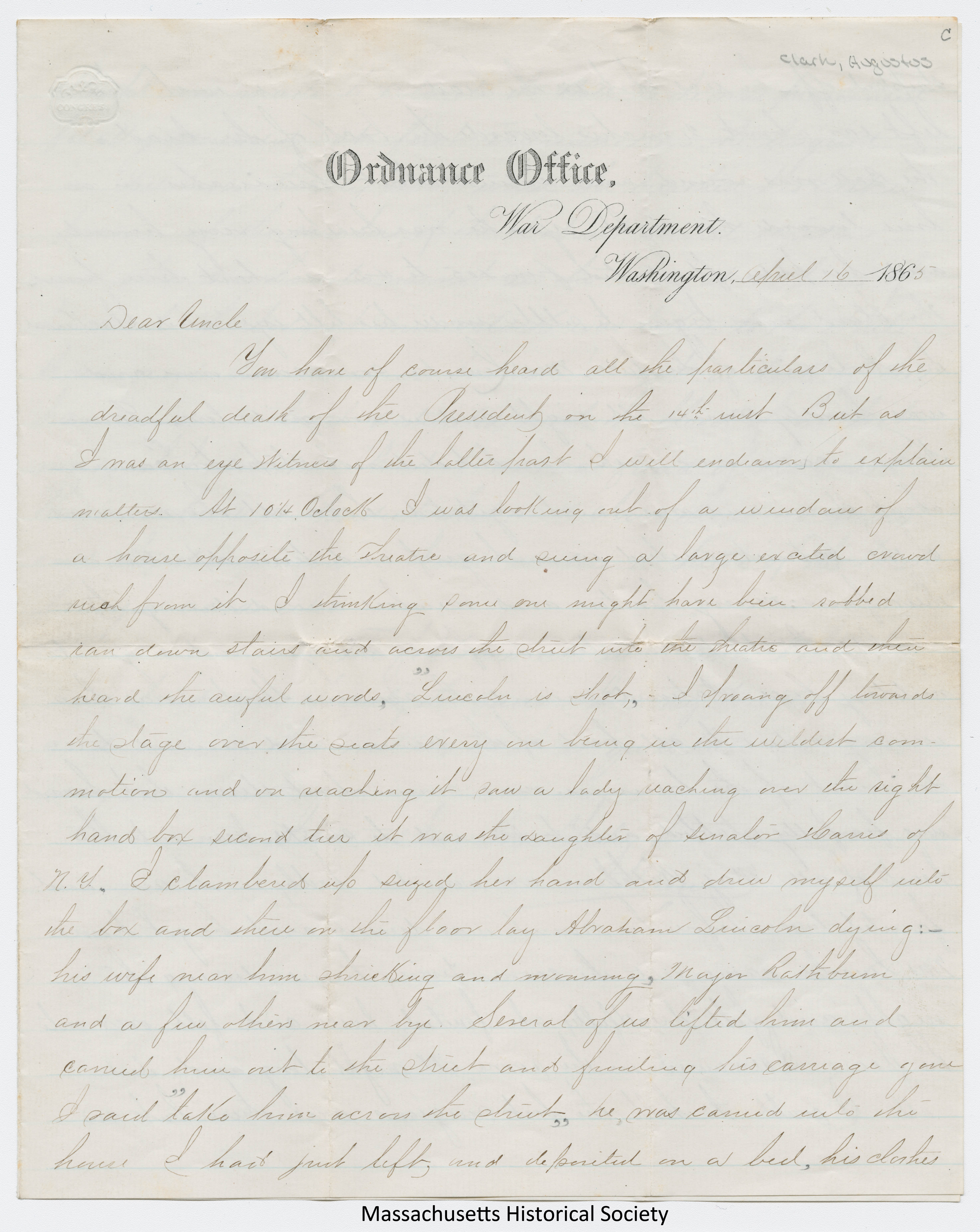
-
Description
This letter, written by Augustus Clark, a War Department employee, to his uncle, Stephen M. Allen of Woburn, Massachusetts, includes a firsthand account of the awful scenes at Ford's Theatre in Washington, D.C. after John Wilkes Booth had shot Abraham Lincoln. Clark also describes what he witnessed at Petersen's boardinghouse across the street from the theatre, where Lincoln died.
-
Source
Massachusetts Historical Society, Special collections, manuscripts
-
Rights
Use of this item for research, teaching, and private study is permitted with proper citation and attribution, as: From the Collection of the Massachusetts Historical Society. Reproduction of this item for publication, broadcast, or commercial use requires written permission. For permission, please see this web page.
-
Creator
Clark, Augustus
-
Date
April 16, 1865
-
Material
25 cm x 20 cm
from Apr. 17, 1865
"Traitors at Home"
-
Full Title
Traitors at Home
-
Description
Article on page 2 of the Monday April 17, 1865 edition of the Cleveland Morning Leader newspaper describing an incident that occurred the previous Saturday afternoon when citizens gathered on Public Square at 3PM to publicly mourn the death of the President by an assassin. J.J. Husband, the architect of the county courthouse on the NW corner of Public Square at that time and likely a Democrat, was heard to say that Lincoln's death was "no great loss." The crown turned on him and ran him out town. A group then chiseled his name off the cornerstone of the courthouse, vowing that his name would never be heard or read again in the city. The article provides details of this infamous event in Cleveland history.
-
Transcription
Cleveland Morning Leader
Monday April 17, 1867 p.2
TRAITORS AT HOME
___
Eulogists of Murder in Cleveland – How
they were treated.
___
It seems providentially provided for that some villains are fools—so great fools that they parade their villainy before the world. Such was the case of certain traitors in Cleveland Saturday, who were crazy enough to express their joy at the murder of the President, and received therefore some very rough treatment, no more, however, than their just deserts.
The case of J. J. Husband, the well-known architect, who occupies an office and rooms over Fogg’s store, was most prominent. He was in high glee over the news, remarking to one man: “You have had your day of rejoicing, now I have mine;” to another: “This is a good day for me,” and to a third that “Lincoln’s death was a d____d small loss.” It seems that afterward he became sensible of the danger he had incurred by these remarks, for he came sneaking to the newspaper offices to deny that he had made them. We have, however, the authority of half a dozen reliable gentleman, who heard his remarks, against his unsupported assertion.
On his way back to his office he was assaulted by the crowd, but escaped from them. His words were repeated from mouth to mouth, and the indignation of the multitude knew no bounds. The crowd searched the building for him, at last finding him on the roof of the building. He was caught, thrown through the skylight into his room, and knocked and kicked down stairs. The mob then set upon him and would perhaps have pounded him to death had he not been rescued by prominent citizens. He was taken to the courthouse and locked up in a room for safekeeping. He broke out and sneaked off during the day, and, we understand, has since left town. He can never show his face again in Cleveland. His name has already been chipped from the place on the court-house where it was cut as architect.
Another man, named James Griffith, from Hamilton, Butler county, in this State, arrived in town Saturday morning, and on hearing of the news, said to a barber who was shaving him in the Weddell House barber shop, that “Lincoln was a d__d son of a b___h, and ought to have been shot long ago.” Hearing of this the mob started after him. He was taken charge of by Clark Warren and others who carried him to the jail. On the way there, however, the mob got at him and pounded him badly. He is now in jail and ought to stay there for a term of months.
Another traitor, expressing his joy on Ontario street, Saturday morning, was knocked stiff by a little fellow half his size. Other men of Southern sympathies knew enough to keep closely at home Saturday. Cleveland is an unhealthy place for rebels.
[Transcription by Deborah Taylor.] -
Source
www.wrhs.org
-
Rights
Permission for personal and research use; publication and reproduction requires permission from the Western Reserve Historical Society.
-
Tags
-
Cite this Item
Cleveland Morning Leader. "Traitors at Home". Cleveland Morning Leader. Remembering Lincoln. Web. Accessed December 14, 2025. https://rememberinglincoln.fords.org/node/223
-
Creator
Cleveland Morning Leader
-
Publisher
Cleveland Morning Leader
-
Date
April 17, 1865
from Apr. 17, 1865
Traitors at Home

-
Description
Article on page 2 of the Monday April 17, 1865 edition of the Cleveland Morning Leader newspaper describing an incident that occurred the previous Saturday afternoon when citizens gathered on Public Square at 3PM to publicly mourn the death of the President by an assassin. J.J. Husband, the architect of the county courthouse on the NW corner of Public Square at that time and likely a Democrat, was heard to say that Lincoln's death was "no great loss." The crown turned on him and ran him out town. A group then chiseled his name off the cornerstone of the courthouse, vowing that his name would never be heard or read again in the city. The article provides details of this infamous event in Cleveland history.
-
Source
www.wrhs.org
-
Rights
Permission for personal and research use; publication and reproduction requires permission from the Western Reserve Historical Society.
-
Creator
Cleveland Morning Leader
-
Publisher
Cleveland Morning Leader
-
Date
April 17, 1865
from Apr. 21, 1865
"Glorious News. Lincoln and Seward Assassinated!"
-
Full Title
"Glorious News. Lincoln and Seward Assassinated! Lee Defeats Grant. Andy Johnson Inaugurated President."
-
Description
Erroneous dispatch originally published in the Demopolis Herald on April 19, 1865 (shown here reprinted in the Alabama Beacon on April 21). While correctly announcing the death of Lincoln and the inauguration of Johnson as president, it reports that Secretary of State Seward was killed as well; in fact, that assassination attempt was not successful. The piece also mentions a rumor from Selma, Alabama, "that Lee and Johnston had effected a junction and whipped Grant soundly. Passengers, wounded soldiers and officers confirm this." The news was sent by the telegraph operator in Meridian, Mississippi.
-
Transcription
[From Demoplis Herald, 19th]
GLORIOUS NEWS.
Lincoln and Seward Assassinated!
LEE DEFEATS GRANT.
Andy Johnson Inaugurated President.
We have been favored with the following private dispatch , which we hasten to lay before our readers, with the hope that it may prove true:
DEMOPOLIS, April 18, 1865 —TO COL. GARNER:—SIR—The operator at Meridian has just telegraphed me that Memphis papers state, over the signature of Secretary Stanton, that Lincoln and Seward were both assassinated the same night at Washington City. Lincoln was shot through the head in the theatre: Seward slain while sick in bed.
Andy Johnson was inaugurated as President of the United States on the 15th.
This is said to be true beyond a doubt.
I inquired particularly from the operator as to whether from the operator as to whether there was anything more in regard to Lee’s capitulation, and he said nothing at all from Northern papers.
A gentlemen just from Selma says it is believed in Selma that Lee and Johnson had effected a junction and whipped Grant soundly. Passengers, wounded soldiers and officers confirm this.
This is given on the authority of the operator at Meridian.
JOHN W. HENLEY, Operator.
[Transcription by: Dr. Susan Corbesero, Ellis School, Pittsburgh, Pennsylvania] -
Source
Excerpt from the Alabama Beacon, book number 33.0010. Catalog record for this title is available here.
-
Rights
Use of this item for research, teaching and private study is permitted with proper citation and attribution, as defined here. Reproduction of this item for publication, broadcast or commercial use requires written permission. For permission, please contact the Alabama Department of Archives and History.
-
Tags
-
Cite this Item
Alabama Beacon. ""Glorious News. Lincoln and Seward Assassinated! Lee Defeats Grant. Andy Johnson Inaugurated President."". Remembering Lincoln. Web. Accessed December 14, 2025. https://rememberinglincoln.fords.org/node/192
from Apr. 21, 1865
"Glorious News. Lincoln and Seward Assassinated! Lee Defeats Grant. Andy Johnson Inaugurated President."
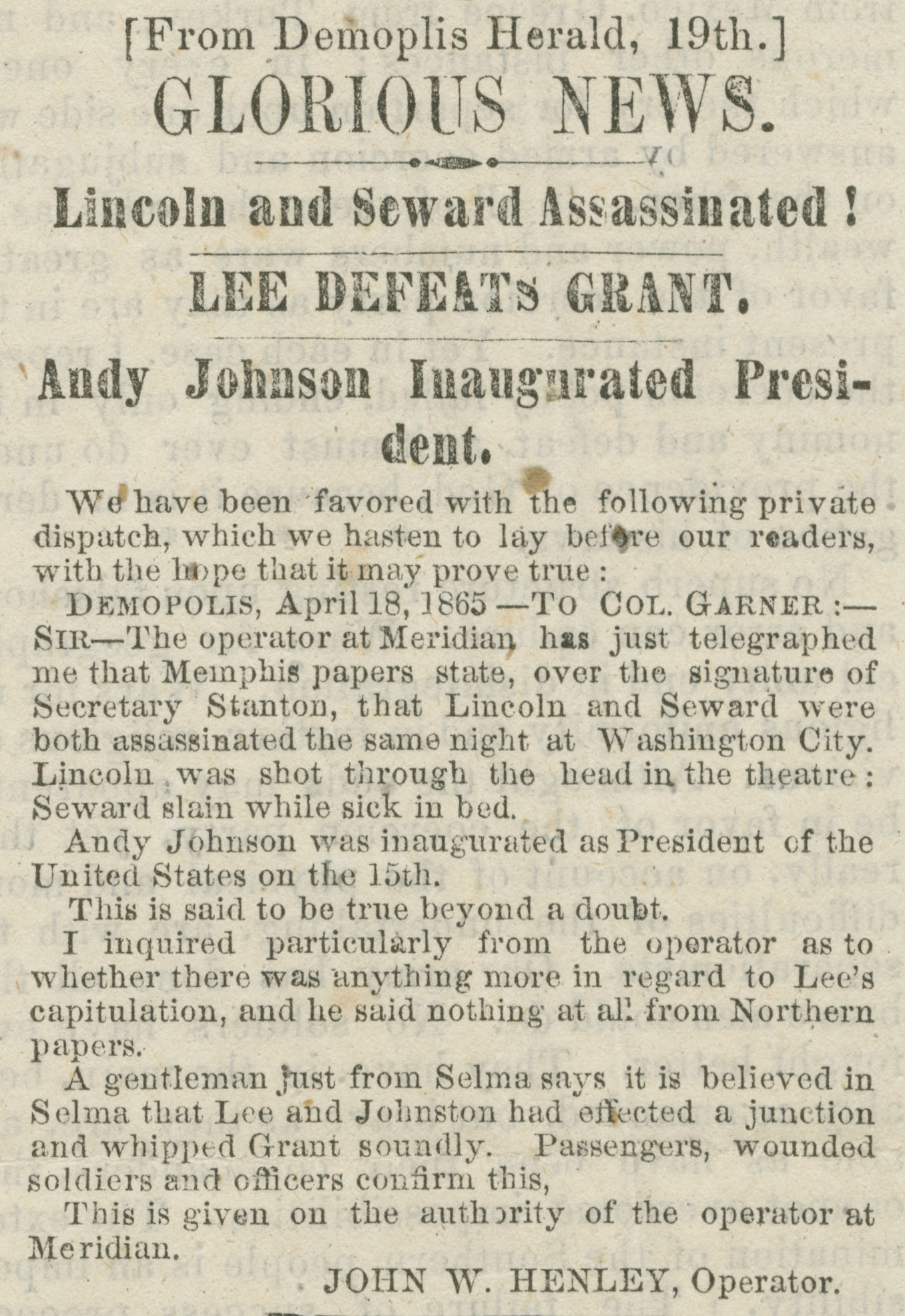
-
Description
Erroneous dispatch originally published in the Demopolis Herald on April 19, 1865 (shown here reprinted in the Alabama Beacon on April 21). While correctly announcing the death of Lincoln and the inauguration of Johnson as president, it reports that Secretary of State Seward was killed as well; in fact, that assassination attempt was not successful. The piece also mentions a rumor from Selma, Alabama, "that Lee and Johnston had effected a junction and whipped Grant soundly. Passengers, wounded soldiers and officers confirm this." The news was sent by the telegraph operator in Meridian, Mississippi.
-
Source
Excerpt from the Alabama Beacon, book number 33.0010. Catalog record for this title is available here.
-
Rights
Use of this item for research, teaching and private study is permitted with proper citation and attribution, as defined here. Reproduction of this item for publication, broadcast or commercial use requires written permission. For permission, please contact the Alabama Department of Archives and History.
-
Creator
Alabama Beacon
-
Date
April 21, 1865
from Feb. 23, 1866
"Frothy Grandiloquence."
-
Full Title
"Frothy Grandiloquence."
-
Description
Editorial criticizing the memorial address delivered by George Bancroft on the birthday of the late President Lincoln. Originally published in The New York World; reprinted in the Montgomery Daily Mail on February 23, 1866.
-
Transcription
FROTHY GRANDILOQUENCE— The New York World speaking of Mr. Rancroft’s attempt to make a “swan of a goose,” and his manner of clothing the most common place feats in mantles of velvet, says:
He has occasion, for example, to say that the only books read by Mr. Lincoln in his boyhood were the Bible, Esop’s Fables, and the Pilgrim’s Progess; but he cannot tell this simple and interesting fact without bedizening and overlaying it without tawdry phrases about Asiatic, Greek, Latin, Medieval, and English literature. Here is Mr. Bancroft’s chaste way of saying it: “Of Asiatic literature he knew only the Bible: of Greek, Latin, and Medieval, no more than Esop’s Fables; of English, John Bunyan’s Pilgram’s Progress.” Did Mr. Bancroft think he was communicating any information, in telling the educated audience he addressed that if young Abraham Lincoln’s three books were classed on so extensive a scale as to include all known literatues, they would be found, on due inquiry, to belong to the divisions he assigns them?
[Transcription by: Dr. Susan Corbesero, Ellis School, Pittsburgh, Pennsylvania] -
Source
Excerpt from the Montgomery Daily Mail, item number ADVCOL42. Catalog record for this title is available here.
-
Rights
Use of this item for research, teaching and private study is permitted with proper citation and attribution, as defined here. Reproduction of this item for publication, broadcast or commercial use requires written permission. For permission, please contact the Alabama Department of Archives and History.
-
Tags
-
Cite this Item
Montgomery Daily Mail. ""Frothy Grandiloquence."". Remembering Lincoln. Web. Accessed December 14, 2025. https://rememberinglincoln.fords.org/node/236
from Feb. 23, 1866
"Frothy Grandiloquence."
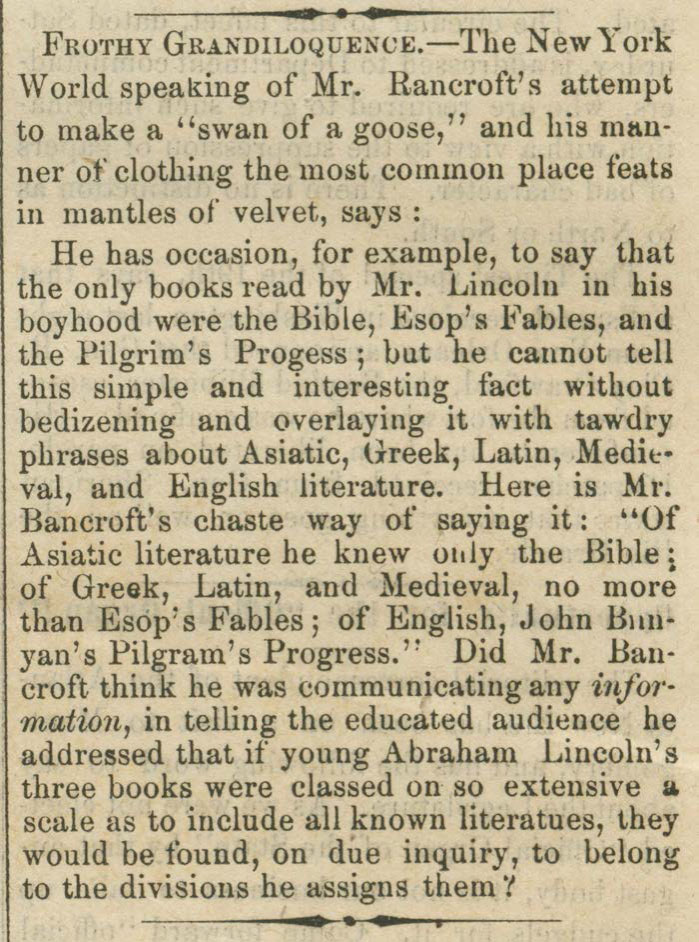
-
Description
Editorial criticizing the memorial address delivered by George Bancroft on the birthday of the late President Lincoln. Originally published in The New York World; reprinted in the Montgomery Daily Mail on February 23, 1866.
-
Source
Excerpt from the Montgomery Daily Mail, item number ADVCOL42. Catalog record for this title is available here.
-
Rights
Use of this item for research, teaching and private study is permitted with proper citation and attribution, as defined here. Reproduction of this item for publication, broadcast or commercial use requires written permission. For permission, please contact the Alabama Department of Archives and History.
-
Creator
Montgomery Daily Mail
-
Date
February 23, 1866
from Feb. 16, 1866
"Danger from a Broken Spine!"
-
Full Title
"Danger from a Broken Spine!"
-
Description
This editorial argues for a reinstitution of the writ of habeas corpus by drawing on a colorful statement made by President Lincoln in a message sent to General Joe Hooker: “I wouldn’t take any risk of being entangled up the river, like an ox half jumped over a fence and liable to be torn by dogs, front and rear, without a fair chance to gore one way or kick the other.” The editorial describes the United States as the metaphorical ox, “stuck fast on the reconstruction thorns.” Published in the Montgomery Daily Mail on February 16, 1866.
-
Transcription
Danger from a Broken Spine!
We are apt to gather inspiration from words of wisdom. Congress has just published a volume of nearly a thousand pages from a Committee on the war. In it we find the following striking dispatch from the late lamented Mr. Lincoln to “Fighting Joe” Hooker, just before the latter was hooked by Lee at Chancellorsville:
“I wouldn’t,” writes the President, “take any risk of being entangled up the river, like an ox jumped half over a fence and liable to be torn by dogs, front and rear, without a fair chance to gore one way or kick the other.”
This striking metaphorical language of Mr. Lincoln will live in history alongside of the figure of Corked-up Butler. As it was then applied to Hooker’s army so it may be now applied to the United States. It is like a huge ox, half-jumped over a bois d’arc hedge and stuck fast on the reconstruction thorns. There sticks the old ox, with tongue hanging out and eyes rolling in agony, unable to gore forwards at John Bull or kick backward at Mexico! If the President will only twist its tail a little or build a fire under its nose, by restoring the write of habeas corpus, we think the old ox will get over.
[Transcription by: Dr. Susan Corbesero, Ellis School, Pittsburgh, Pennsylvania]
-
Source
Excerpt from the Montgomery Daily Mail, item number ADVCOL42. Catalog record for this title is available here.
-
Rights
Use of this item for research, teaching and private study is permitted with proper citation and attribution, as defined here. Reproduction of this item for publication, broadcast or commercial use requires written permission. For permission, please contact the Alabama Department of Archives and History.
-
Tags
-
Cite this Item
Montgomery Daily Mail. ""Danger from a Broken Spine!"". Remembering Lincoln. Web. Accessed December 14, 2025. https://rememberinglincoln.fords.org/node/231
from Feb. 16, 1866
"Danger from a Broken Spine!"

-
Description
This editorial argues for a reinstitution of the writ of habeas corpus by drawing on a colorful statement made by President Lincoln in a message sent to General Joe Hooker: “I wouldn’t take any risk of being entangled up the river, like an ox half jumped over a fence and liable to be torn by dogs, front and rear, without a fair chance to gore one way or kick the other.” The editorial describes the United States as the metaphorical ox, “stuck fast on the reconstruction thorns.” Published in the Montgomery Daily Mail on February 16, 1866.
-
Source
Excerpt from the Montgomery Daily Mail, item number ADVCOL42. Catalog record for this title is available here.
-
Rights
Use of this item for research, teaching and private study is permitted with proper citation and attribution, as defined here. Reproduction of this item for publication, broadcast or commercial use requires written permission. For permission, please contact the Alabama Department of Archives and History.
-
Creator
Montgomery Daily Mail
-
Date
February 16, 1866
